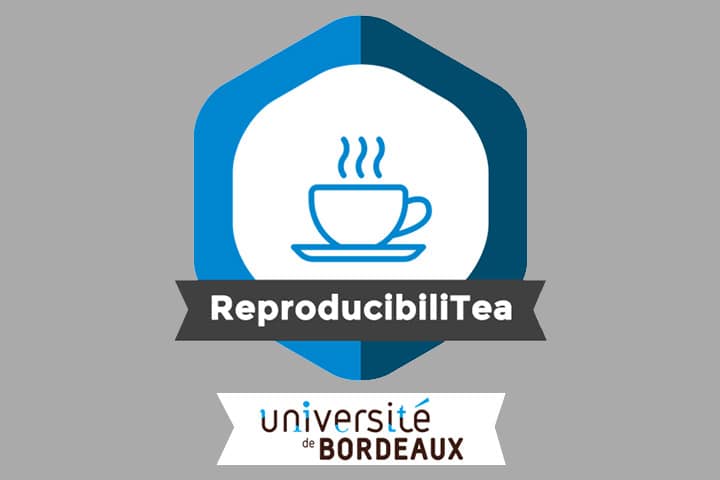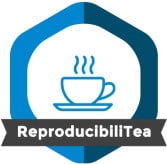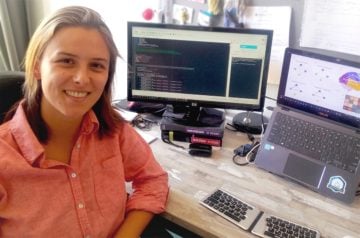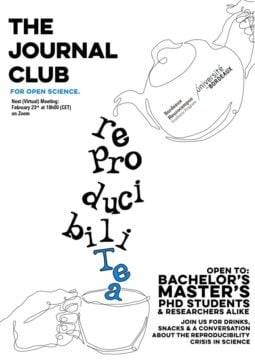
ReproducibiliTea : Open Science Journal Club
 The Bordeaux Neurocampus Graduate Program brings for 2021 a new activity to the Bordeaux Neurocampus community, the open science journal club ReproducibiliTea. ReproducibiliTea consists in a cycle of monthly meetings in which students and young researchers can join to discuss various topics related to Open Science around a warm cup of tea and (why not?) delicious cookies (as soon as the pandemic situation allows gatherings again).
The Bordeaux Neurocampus Graduate Program brings for 2021 a new activity to the Bordeaux Neurocampus community, the open science journal club ReproducibiliTea. ReproducibiliTea consists in a cycle of monthly meetings in which students and young researchers can join to discuss various topics related to Open Science around a warm cup of tea and (why not?) delicious cookies (as soon as the pandemic situation allows gatherings again).
The initiative came from Eduarda Centeno who was awarded a PhD fellowship from the Bordeaux Neurocampus Graduate Program. She is starting her PhD work with Arthur Leblois in the team Physiology and pathophysiology of executive functions (IMN). Eduarda, recently graduated with an MSc in Neuroscience through the Neurasmus joint program between the University of Bordeaux and the Vrije Universiteit Amsterdam. Eduarda is an active member of @VuAmsterdamTea and now the drive for @BordeauxTea. She is telling us more about this initiative.
What is the ReproducibiliTea?

Eduarda Centeno: The ReproducibiliTea is a journal club initiative that fosters the creation of local Open Science (OS) journal clubs at universities worldwide. The goal is to discuss diverse issues, papers, and ideas on how to improve science and reproducibility under the OS framework. The global initiative was started in 2018 by the University of Oxford, and it is currently present in 111 institutions in 25 different countries.
What does it brings to the Bordeaux Neurocampus community?
The journal club allows students to learn more about the OS movement and practical tips on implementing OS standards and guidelines early in their careers. For example, students can learn about several resources that fall under the OS umbrella: new statistical analysis pipelines that aim to improve transparency (e.g., multiverse analysis), resources for data management, sharing, and storage (e.g., Zenodo), useful tools for coding (version control & GitHub, Jupyter Notebooks, documentation software); platforms for open access publishing (e.g., bioRxiv, Directory of Open Access Journals – DOAJ); and various other open-source tools that can be useful in the different steps of research production. Plus according to the Neurocampus graduate program being part of the organization of ReproducibiliTea counts as training hours.
 What makes this Journal Club special? In which aspects does it differ from other journal clubs?
What makes this Journal Club special? In which aspects does it differ from other journal clubs?
Modern science is moving towards a new framework – an open and more transparent way of doing science. The topic is now considered one of the priorities of the European Commission. With Plan S being implemented in Europe and the growing OS-focused funding in European research, young investigators must join the discussion and understand what this paradigm change implies.
By joining the BordeauxTea, students will have a place to learn and discuss the OS movement with their peers. The sessions are aimed to be a safe space to discuss research in general, thus also providing a support network for students. Moreover, we aim to have exchange/joint sessions with other journal clubs, therefore providing the students with a chance to network and mingle with new people!
How many hours would one have to dedicate?
Each live session has a duration of 1 hour. The first 10-15 minutes will be the host’s presentation on the chosen article, then the remaining 45-50 minutes are dedicated for an informal “round-table” discussion.
All students can join the newsletter or registering through the slack channel #BordeauxTea, twitter @BordeauxTea or directly by email
Source : https://neurocampus-graduateprogram.u-bordeaux.fr/
Mise à jour: 29/01/21
